Database Engineer Resume Examples

Jul 18, 2024
|
12 min read
Optimize your job search with a database engineer resume that is clearly "indexed" to your skills. Learn how to structure your experience, highlight key projects, and stand out to potential employers.
Rated by 348 people
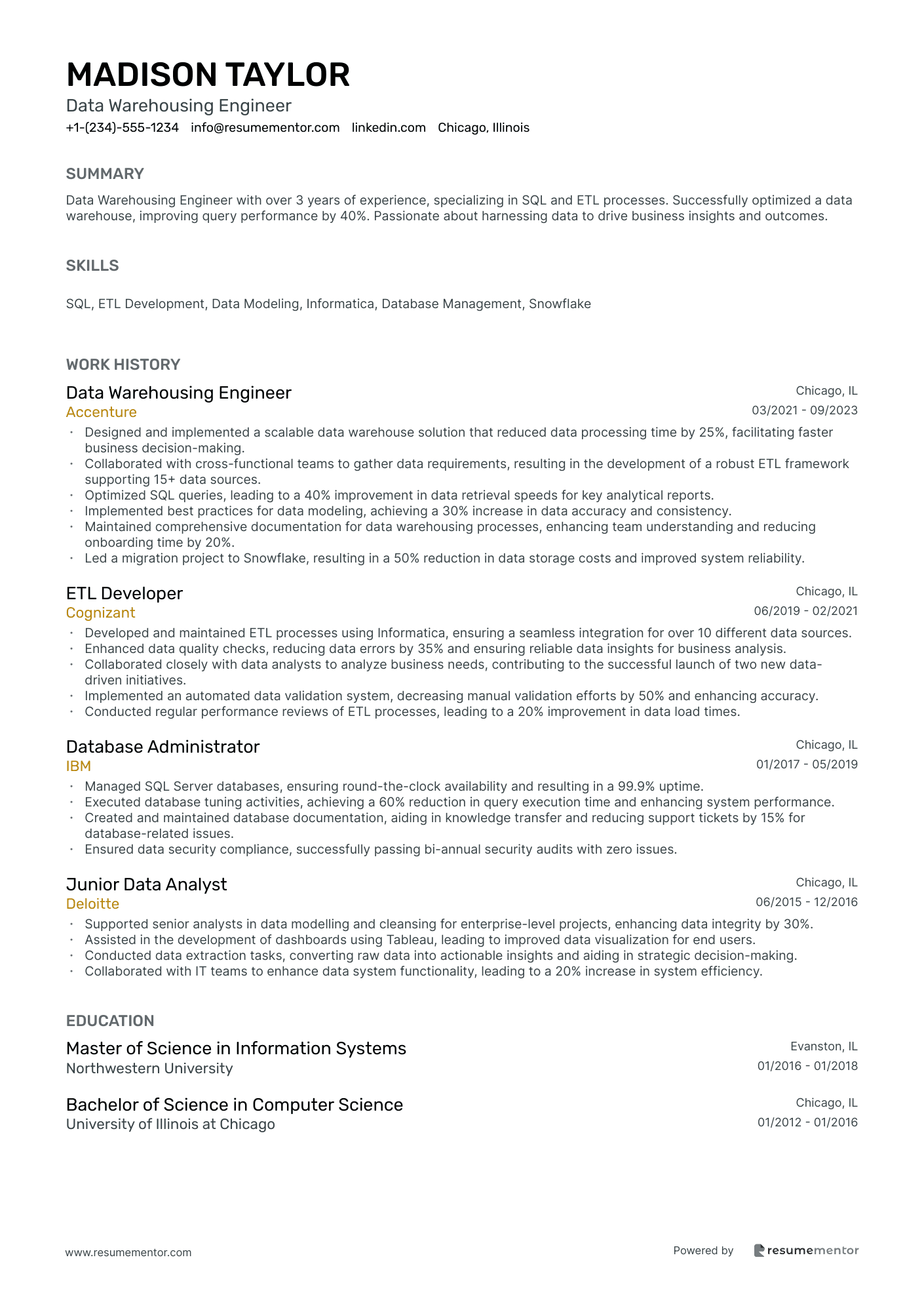
Data Warehousing Engineer
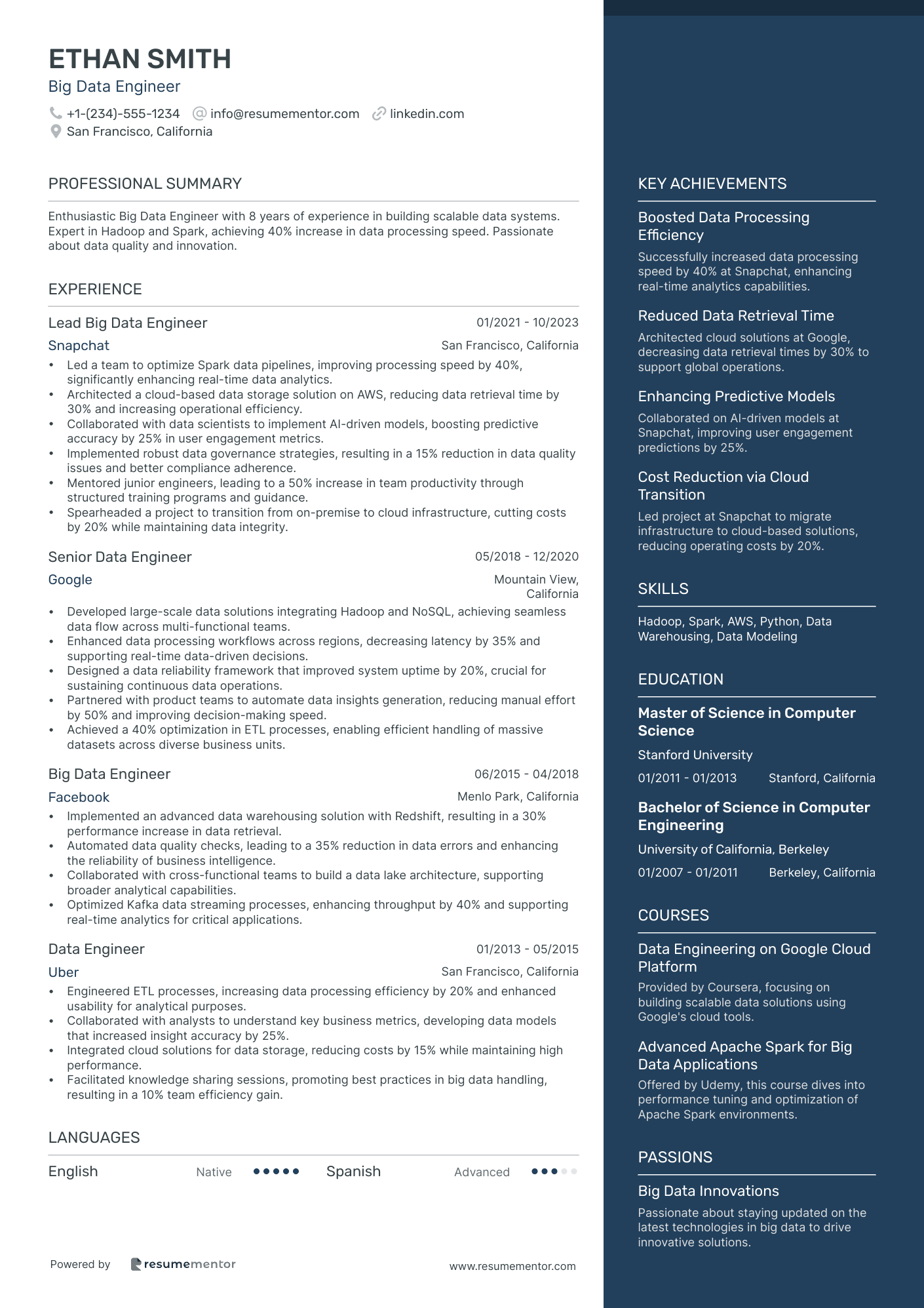
Big Data Engineer
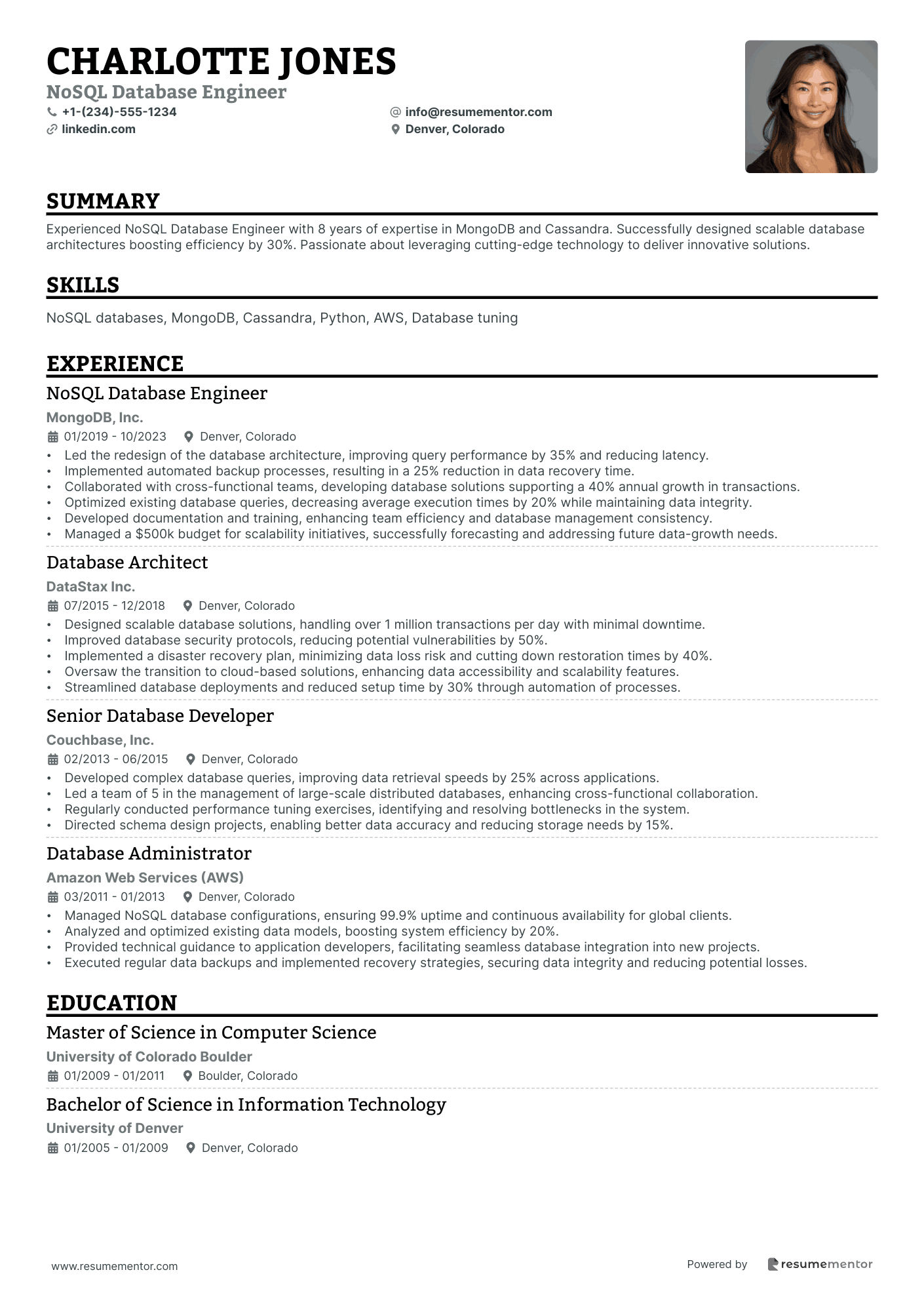
NoSQL Database Engineer
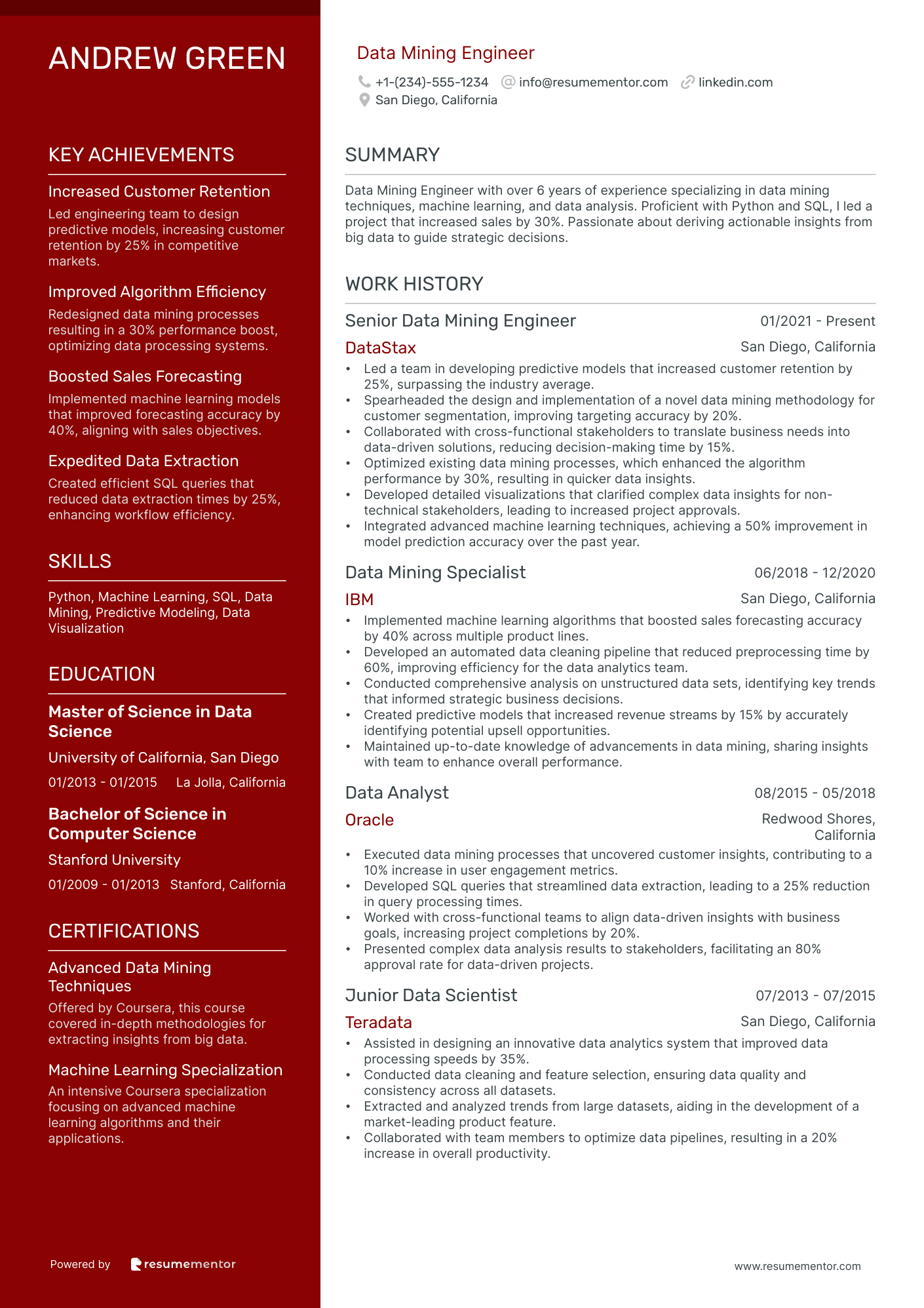
Data Mining Engineer
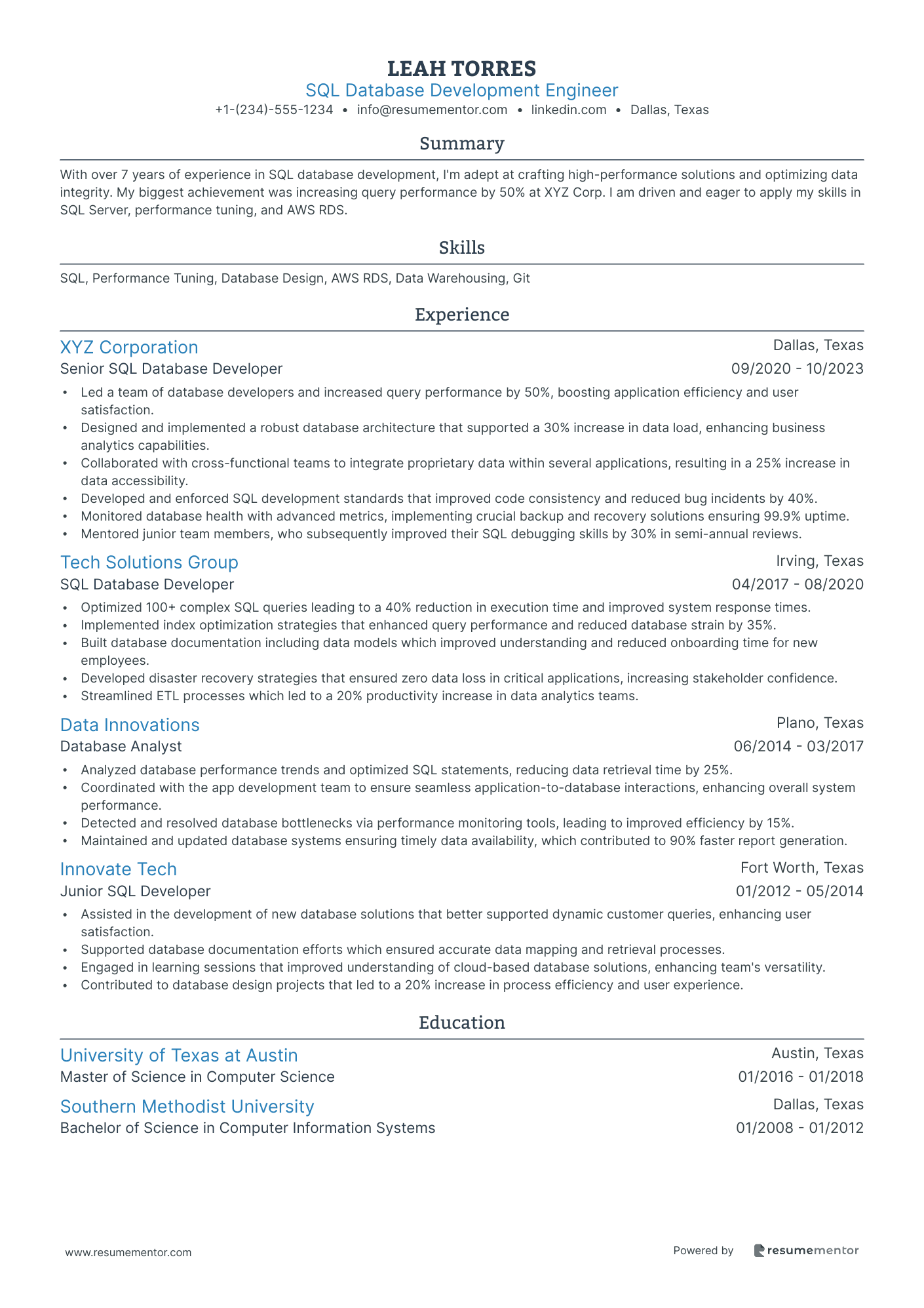
SQL Database Development Engineer
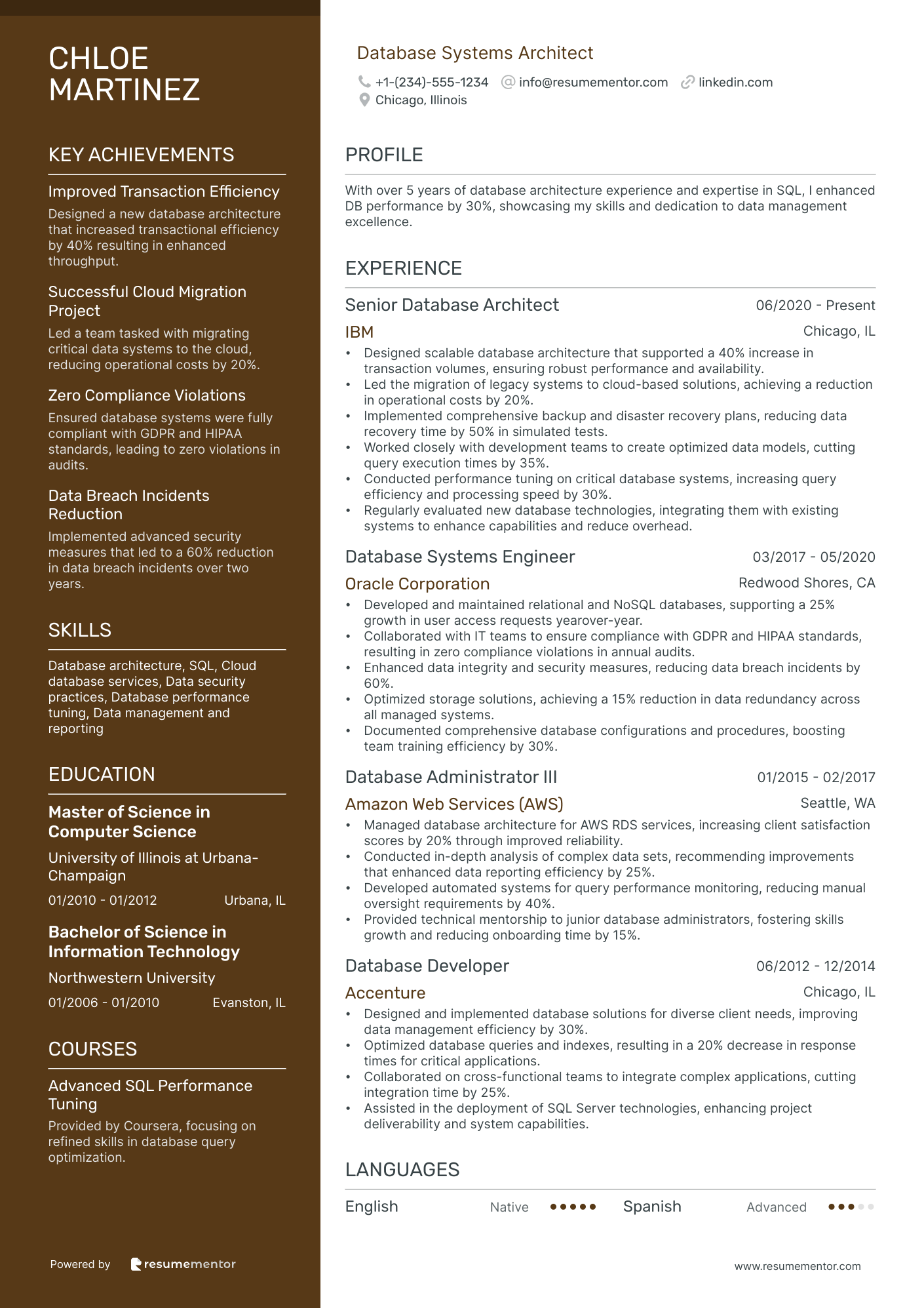
Database Systems Architect
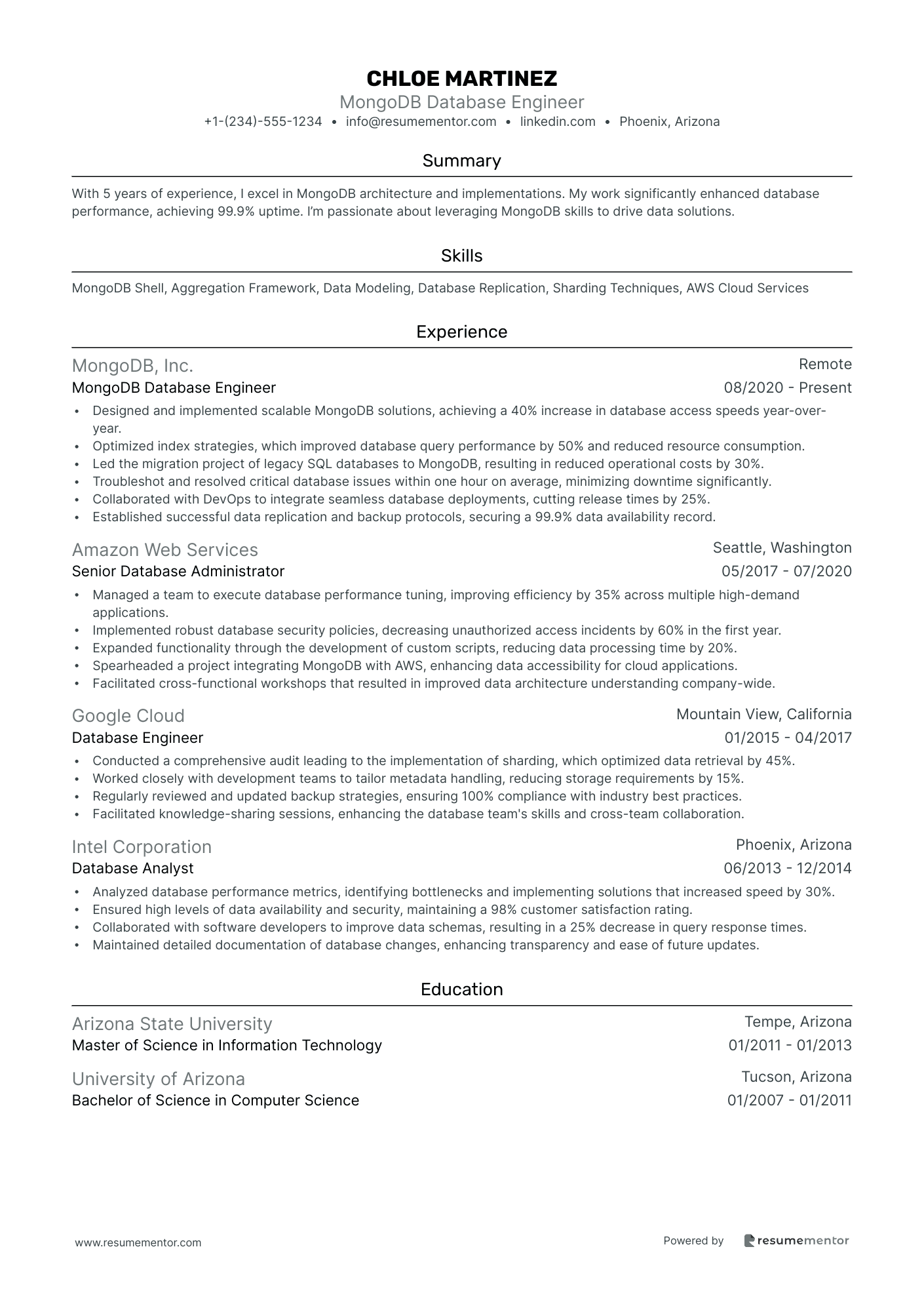
MongoDB Database Engineer
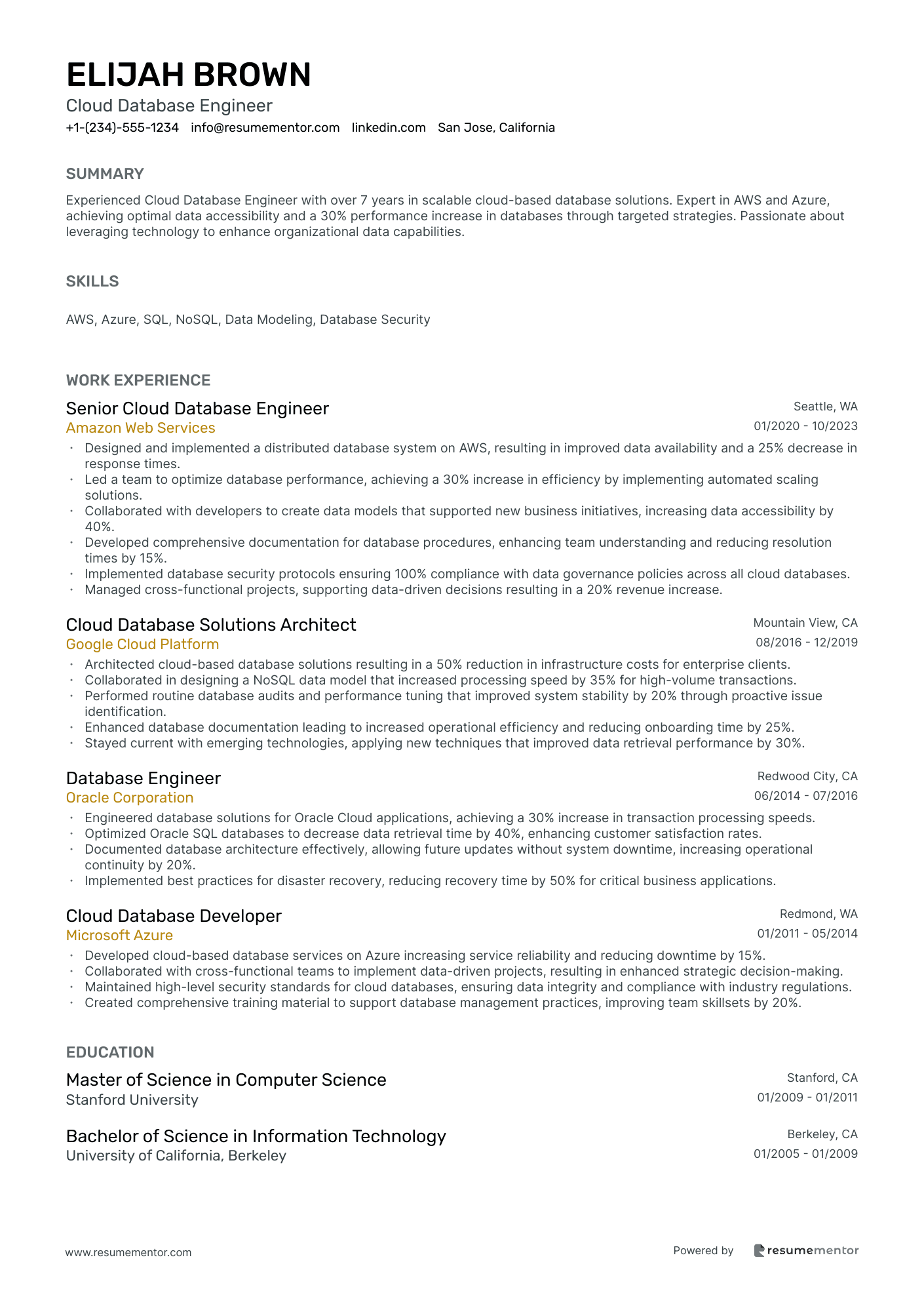
Cloud Database Engineer
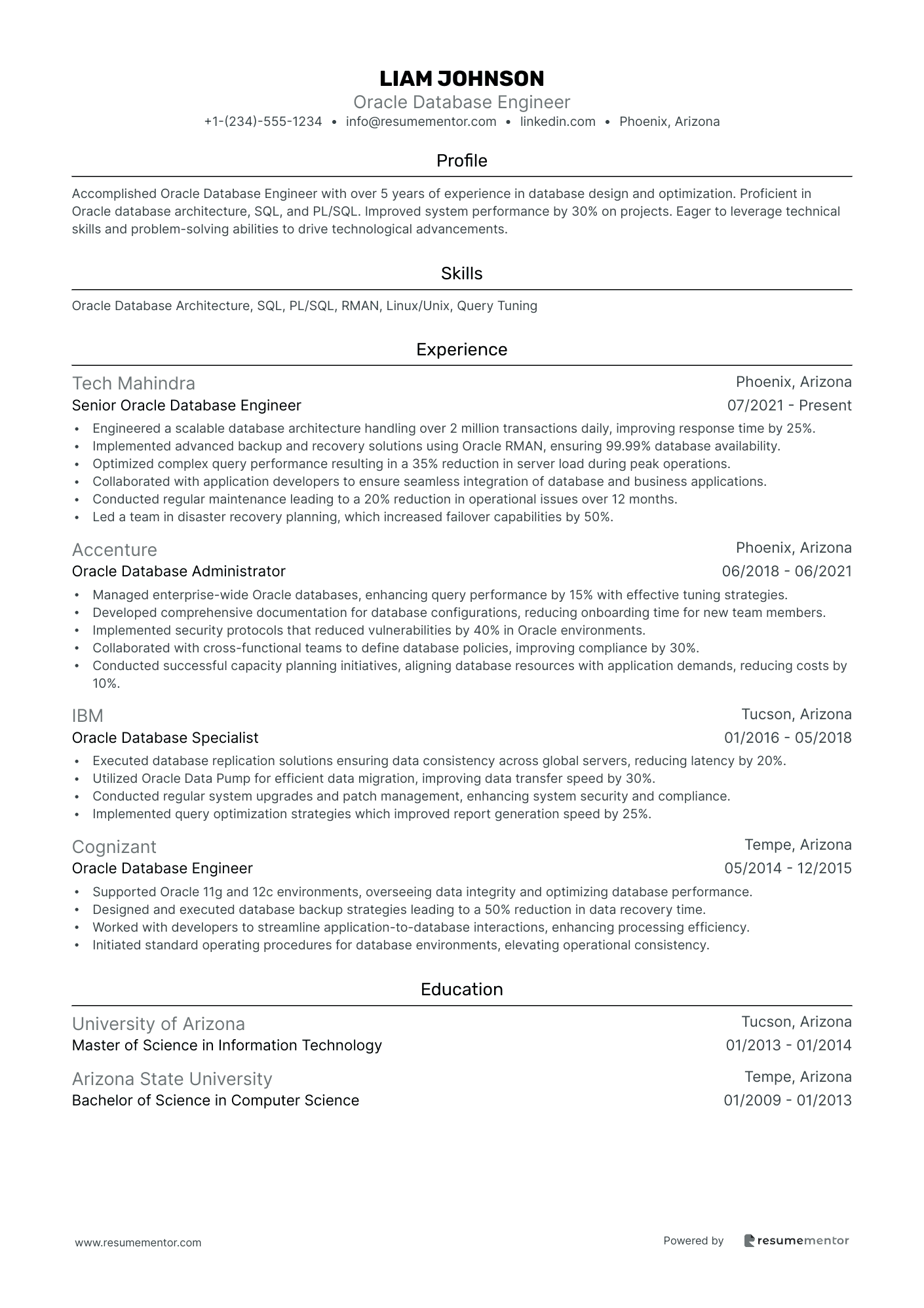
Oracle Database Engineer
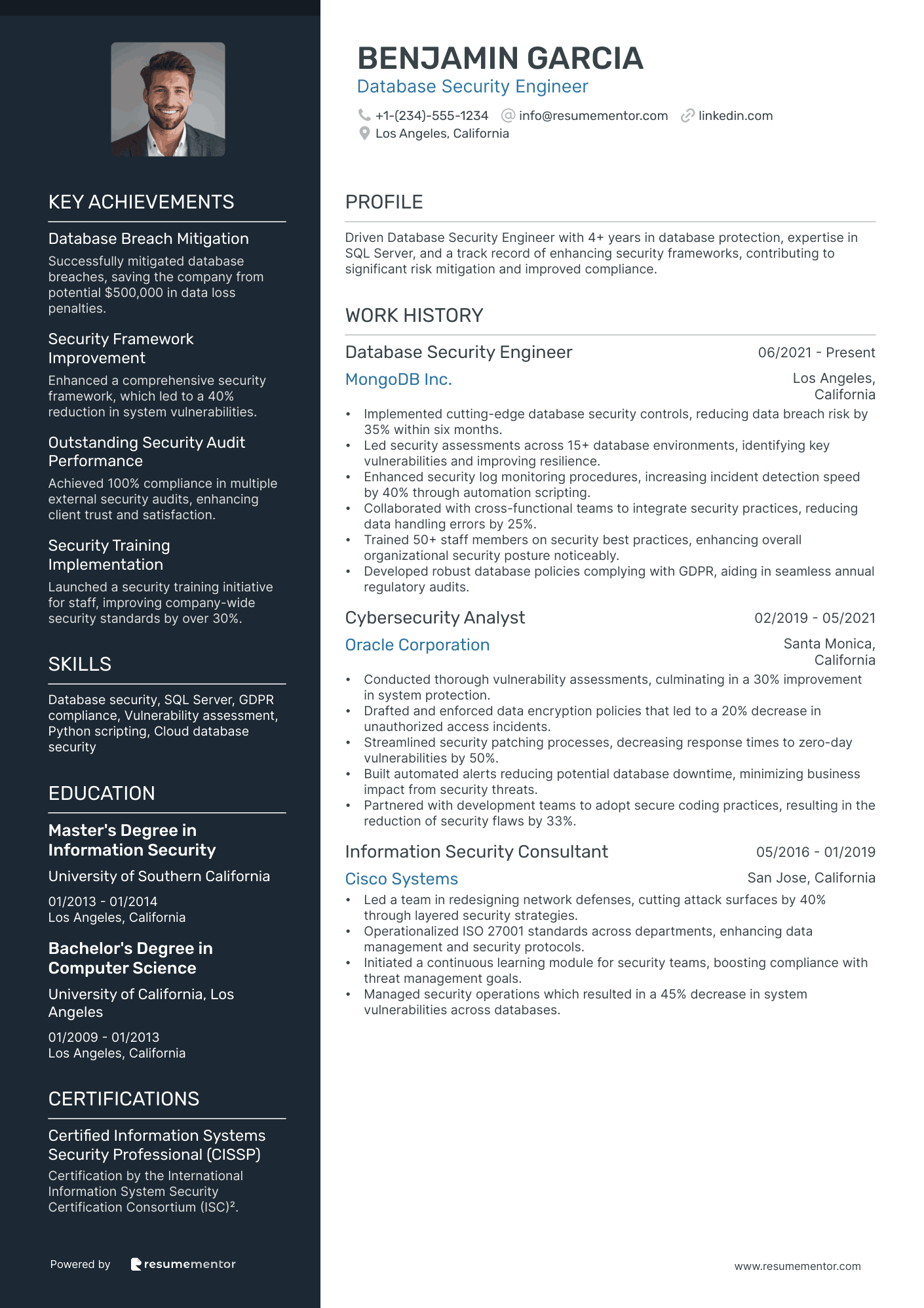
Database Security Engineer

Data Warehousing Engineer resume sample
- •Designed and implemented a scalable data warehouse solution that reduced data processing time by 25%, facilitating faster business decision-making.
- •Collaborated with cross-functional teams to gather data requirements, resulting in the development of a robust ETL framework supporting 15+ data sources.
- •Optimized SQL queries, leading to a 40% improvement in data retrieval speeds for key analytical reports.
- •Implemented best practices for data modeling, achieving a 30% increase in data accuracy and consistency.
- •Maintained comprehensive documentation for data warehousing processes, enhancing team understanding and reducing onboarding time by 20%.
- •Led a migration project to Snowflake, resulting in a 50% reduction in data storage costs and improved system reliability.
- •Developed and maintained ETL processes using Informatica, ensuring a seamless integration for over 10 different data sources.
- •Enhanced data quality checks, reducing data errors by 35% and ensuring reliable data insights for business analysis.
- •Collaborated closely with data analysts to analyze business needs, contributing to the successful launch of two new data-driven initiatives.
- •Implemented an automated data validation system, decreasing manual validation efforts by 50% and enhancing accuracy.
- •Conducted regular performance reviews of ETL processes, leading to a 20% improvement in data load times.
- •Managed SQL Server databases, ensuring round-the-clock availability and resulting in a 99.9% uptime.
- •Executed database tuning activities, achieving a 60% reduction in query execution time and enhancing system performance.
- •Created and maintained database documentation, aiding in knowledge transfer and reducing support tickets by 15% for database-related issues.
- •Ensured data security compliance, successfully passing bi-annual security audits with zero issues.
- •Supported senior analysts in data modelling and cleansing for enterprise-level projects, enhancing data integrity by 30%.
- •Assisted in the development of dashboards using Tableau, leading to improved data visualization for end users.
- •Conducted data extraction tasks, converting raw data into actionable insights and aiding in strategic decision-making.
- •Collaborated with IT teams to enhance data system functionality, leading to a 20% increase in system efficiency.
Big Data Engineer resume sample
- •Led a team to optimize Spark data pipelines, improving processing speed by 40%, significantly enhancing real-time data analytics.
- •Architected a cloud-based data storage solution on AWS, reducing data retrieval time by 30% and increasing operational efficiency.
- •Collaborated with data scientists to implement AI-driven models, boosting predictive accuracy by 25% in user engagement metrics.
- •Implemented robust data governance strategies, resulting in a 15% reduction in data quality issues and better compliance adherence.
- •Mentored junior engineers, leading to a 50% increase in team productivity through structured training programs and guidance.
- •Spearheaded a project to transition from on-premise to cloud infrastructure, cutting costs by 20% while maintaining data integrity.
- •Developed large-scale data solutions integrating Hadoop and NoSQL, achieving seamless data flow across multi-functional teams.
- •Enhanced data processing workflows across regions, decreasing latency by 35% and supporting real-time data-driven decisions.
- •Designed a data reliability framework that improved system uptime by 20%, crucial for sustaining continuous data operations.
- •Partnered with product teams to automate data insights generation, reducing manual effort by 50% and improving decision-making speed.
- •Achieved a 40% optimization in ETL processes, enabling efficient handling of massive datasets across diverse business units.
- •Implemented an advanced data warehousing solution with Redshift, resulting in a 30% performance increase in data retrieval.
- •Automated data quality checks, leading to a 35% reduction in data errors and enhancing the reliability of business intelligence.
- •Collaborated with cross-functional teams to build a data lake architecture, supporting broader analytical capabilities.
- •Optimized Kafka data streaming processes, enhancing throughput by 40% and supporting real-time analytics for critical applications.
- •Engineered ETL processes, increasing data processing efficiency by 20% and enhanced usability for analytical purposes.
- •Collaborated with analysts to understand key business metrics, developing data models that increased insight accuracy by 25%.
- •Integrated cloud solutions for data storage, reducing costs by 15% while maintaining high performance.
- •Facilitated knowledge sharing sessions, promoting best practices in big data handling, resulting in a 10% team efficiency gain.
NoSQL Database Engineer resume sample
- •Led the redesign of the database architecture, improving query performance by 35% and reducing latency.
- •Implemented automated backup processes, resulting in a 25% reduction in data recovery time.
- •Collaborated with cross-functional teams, developing database solutions supporting a 40% annual growth in transactions.
- •Optimized existing database queries, decreasing average execution times by 20% while maintaining data integrity.
- •Developed documentation and training, enhancing team efficiency and database management consistency.
- •Managed a $500k budget for scalability initiatives, successfully forecasting and addressing future data-growth needs.
- •Designed scalable database solutions, handling over 1 million transactions per day with minimal downtime.
- •Improved database security protocols, reducing potential vulnerabilities by 50%.
- •Implemented a disaster recovery plan, minimizing data loss risk and cutting down restoration times by 40%.
- •Oversaw the transition to cloud-based solutions, enhancing data accessibility and scalability features.
- •Streamlined database deployments and reduced setup time by 30% through automation of processes.
- •Developed complex database queries, improving data retrieval speeds by 25% across applications.
- •Led a team of 5 in the management of large-scale distributed databases, enhancing cross-functional collaboration.
- •Regularly conducted performance tuning exercises, identifying and resolving bottlenecks in the system.
- •Directed schema design projects, enabling better data accuracy and reducing storage needs by 15%.
- •Managed NoSQL database configurations, ensuring 99.9% uptime and continuous availability for global clients.
- •Analyzed and optimized existing data models, boosting system efficiency by 20%.
- •Provided technical guidance to application developers, facilitating seamless database integration into new projects.
- •Executed regular data backups and implemented recovery strategies, securing data integrity and reducing potential losses.
Data Mining Engineer resume sample
- •Led a team in developing predictive models that increased customer retention by 25%, surpassing the industry average.
- •Spearheaded the design and implementation of a novel data mining methodology for customer segmentation, improving targeting accuracy by 20%.
- •Collaborated with cross-functional stakeholders to translate business needs into data-driven solutions, reducing decision-making time by 15%.
- •Optimized existing data mining processes, which enhanced the algorithm performance by 30%, resulting in quicker data insights.
- •Developed detailed visualizations that clarified complex data insights for non-technical stakeholders, leading to increased project approvals.
- •Integrated advanced machine learning techniques, achieving a 50% improvement in model prediction accuracy over the past year.
- •Implemented machine learning algorithms that boosted sales forecasting accuracy by 40% across multiple product lines.
- •Developed an automated data cleaning pipeline that reduced preprocessing time by 60%, improving efficiency for the data analytics team.
- •Conducted comprehensive analysis on unstructured data sets, identifying key trends that informed strategic business decisions.
- •Created predictive models that increased revenue streams by 15% by accurately identifying potential upsell opportunities.
- •Maintained up-to-date knowledge of advancements in data mining, sharing insights with team to enhance overall performance.
- •Executed data mining processes that uncovered customer insights, contributing to a 10% increase in user engagement metrics.
- •Developed SQL queries that streamlined data extraction, leading to a 25% reduction in query processing times.
- •Worked with cross-functional teams to align data-driven insights with business goals, increasing project completions by 20%.
- •Presented complex data analysis results to stakeholders, facilitating an 80% approval rate for data-driven projects.
- •Assisted in designing an innovative data analytics system that improved data processing speeds by 35%.
- •Conducted data cleaning and feature selection, ensuring data quality and consistency across all datasets.
- •Extracted and analyzed trends from large datasets, aiding in the development of a market-leading product feature.
- •Collaborated with team members to optimize data pipelines, resulting in a 20% increase in overall productivity.
SQL Database Development Engineer resume sample
- •Led a team of database developers and increased query performance by 50%, boosting application efficiency and user satisfaction.
- •Designed and implemented a robust database architecture that supported a 30% increase in data load, enhancing business analytics capabilities.
- •Collaborated with cross-functional teams to integrate proprietary data within several applications, resulting in a 25% increase in data accessibility.
- •Developed and enforced SQL development standards that improved code consistency and reduced bug incidents by 40%.
- •Monitored database health with advanced metrics, implementing crucial backup and recovery solutions ensuring 99.9% uptime.
- •Mentored junior team members, who subsequently improved their SQL debugging skills by 30% in semi-annual reviews.
- •Optimized 100+ complex SQL queries leading to a 40% reduction in execution time and improved system response times.
- •Implemented index optimization strategies that enhanced query performance and reduced database strain by 35%.
- •Built database documentation including data models which improved understanding and reduced onboarding time for new employees.
- •Developed disaster recovery strategies that ensured zero data loss in critical applications, increasing stakeholder confidence.
- •Streamlined ETL processes which led to a 20% productivity increase in data analytics teams.
- •Analyzed database performance trends and optimized SQL statements, reducing data retrieval time by 25%.
- •Coordinated with the app development team to ensure seamless application-to-database interactions, enhancing overall system performance.
- •Detected and resolved database bottlenecks via performance monitoring tools, leading to improved efficiency by 15%.
- •Maintained and updated database systems ensuring timely data availability, which contributed to 90% faster report generation.
- •Assisted in the development of new database solutions that better supported dynamic customer queries, enhancing user satisfaction.
- •Supported database documentation efforts which ensured accurate data mapping and retrieval processes.
- •Engaged in learning sessions that improved understanding of cloud-based database solutions, enhancing team's versatility.
- •Contributed to database design projects that led to a 20% increase in process efficiency and user experience.
Database Systems Architect resume sample
- •Designed scalable database architecture that supported a 40% increase in transaction volumes, ensuring robust performance and availability.
- •Led the migration of legacy systems to cloud-based solutions, achieving a reduction in operational costs by 20%.
- •Implemented comprehensive backup and disaster recovery plans, reducing data recovery time by 50% in simulated tests.
- •Worked closely with development teams to create optimized data models, cutting query execution times by 35%.
- •Conducted performance tuning on critical database systems, increasing query efficiency and processing speed by 30%.
- •Regularly evaluated new database technologies, integrating them with existing systems to enhance capabilities and reduce overhead.
- •Developed and maintained relational and NoSQL databases, supporting a 25% growth in user access requests yearover-year.
- •Collaborated with IT teams to ensure compliance with GDPR and HIPAA standards, resulting in zero compliance violations in annual audits.
- •Enhanced data integrity and security measures, reducing data breach incidents by 60%.
- •Optimized storage solutions, achieving a 15% reduction in data redundancy across all managed systems.
- •Documented comprehensive database configurations and procedures, boosting team training efficiency by 30%.
- •Managed database architecture for AWS RDS services, increasing client satisfaction scores by 20% through improved reliability.
- •Conducted in-depth analysis of complex data sets, recommending improvements that enhanced data reporting efficiency by 25%.
- •Developed automated systems for query performance monitoring, reducing manual oversight requirements by 40%.
- •Provided technical mentorship to junior database administrators, fostering skills growth and reducing onboarding time by 15%.
- •Designed and implemented database solutions for diverse client needs, improving data management efficiency by 30%.
- •Optimized database queries and indexes, resulting in a 20% decrease in response times for critical applications.
- •Collaborated on cross-functional teams to integrate complex applications, cutting integration time by 25%.
- •Assisted in the deployment of SQL Server technologies, enhancing project deliverability and system capabilities.
MongoDB Database Engineer resume sample
- •Designed and implemented scalable MongoDB solutions, achieving a 40% increase in database access speeds year-over-year.
- •Optimized index strategies, which improved database query performance by 50% and reduced resource consumption.
- •Led the migration project of legacy SQL databases to MongoDB, resulting in reduced operational costs by 30%.
- •Troubleshot and resolved critical database issues within one hour on average, minimizing downtime significantly.
- •Collaborated with DevOps to integrate seamless database deployments, cutting release times by 25%.
- •Established successful data replication and backup protocols, securing a 99.9% data availability record.
- •Managed a team to execute database performance tuning, improving efficiency by 35% across multiple high-demand applications.
- •Implemented robust database security policies, decreasing unauthorized access incidents by 60% in the first year.
- •Expanded functionality through the development of custom scripts, reducing data processing time by 20%.
- •Spearheaded a project integrating MongoDB with AWS, enhancing data accessibility for cloud applications.
- •Facilitated cross-functional workshops that resulted in improved data architecture understanding company-wide.
- •Conducted a comprehensive audit leading to the implementation of sharding, which optimized data retrieval by 45%.
- •Worked closely with development teams to tailor metadata handling, reducing storage requirements by 15%.
- •Regularly reviewed and updated backup strategies, ensuring 100% compliance with industry best practices.
- •Facilitated knowledge-sharing sessions, enhancing the database team's skills and cross-team collaboration.
- •Analyzed database performance metrics, identifying bottlenecks and implementing solutions that increased speed by 30%.
- •Ensured high levels of data availability and security, maintaining a 98% customer satisfaction rating.
- •Collaborated with software developers to improve data schemas, resulting in a 25% decrease in query response times.
- •Maintained detailed documentation of database changes, enhancing transparency and ease of future updates.
Cloud Database Engineer resume sample
- •Designed and implemented a distributed database system on AWS, resulting in improved data availability and a 25% decrease in response times.
- •Led a team to optimize database performance, achieving a 30% increase in efficiency by implementing automated scaling solutions.
- •Collaborated with developers to create data models that supported new business initiatives, increasing data accessibility by 40%.
- •Developed comprehensive documentation for database procedures, enhancing team understanding and reducing resolution times by 15%.
- •Implemented database security protocols ensuring 100% compliance with data governance policies across all cloud databases.
- •Managed cross-functional projects, supporting data-driven decisions resulting in a 20% revenue increase.
- •Architected cloud-based database solutions resulting in a 50% reduction in infrastructure costs for enterprise clients.
- •Collaborated in designing a NoSQL data model that increased processing speed by 35% for high-volume transactions.
- •Performed routine database audits and performance tuning that improved system stability by 20% through proactive issue identification.
- •Enhanced database documentation leading to increased operational efficiency and reducing onboarding time by 25%.
- •Stayed current with emerging technologies, applying new techniques that improved data retrieval performance by 30%.
- •Engineered database solutions for Oracle Cloud applications, achieving a 30% increase in transaction processing speeds.
- •Optimized Oracle SQL databases to decrease data retrieval time by 40%, enhancing customer satisfaction rates.
- •Documented database architecture effectively, allowing future updates without system downtime, increasing operational continuity by 20%.
- •Implemented best practices for disaster recovery, reducing recovery time by 50% for critical business applications.
- •Developed cloud-based database services on Azure increasing service reliability and reducing downtime by 15%.
- •Collaborated with cross-functional teams to implement data-driven projects, resulting in enhanced strategic decision-making.
- •Maintained high-level security standards for cloud databases, ensuring data integrity and compliance with industry regulations.
- •Created comprehensive training material to support database management practices, improving team skillsets by 20%.
Oracle Database Engineer resume sample
- •Engineered a scalable database architecture handling over 2 million transactions daily, improving response time by 25%.
- •Implemented advanced backup and recovery solutions using Oracle RMAN, ensuring 99.99% database availability.
- •Optimized complex query performance resulting in a 35% reduction in server load during peak operations.
- •Collaborated with application developers to ensure seamless integration of database and business applications.
- •Conducted regular maintenance leading to a 20% reduction in operational issues over 12 months.
- •Led a team in disaster recovery planning, which increased failover capabilities by 50%.
- •Managed enterprise-wide Oracle databases, enhancing query performance by 15% with effective tuning strategies.
- •Developed comprehensive documentation for database configurations, reducing onboarding time for new team members.
- •Implemented security protocols that reduced vulnerabilities by 40% in Oracle environments.
- •Collaborated with cross-functional teams to define database policies, improving compliance by 30%.
- •Conducted successful capacity planning initiatives, aligning database resources with application demands, reducing costs by 10%.
- •Executed database replication solutions ensuring data consistency across global servers, reducing latency by 20%.
- •Utilized Oracle Data Pump for efficient data migration, improving data transfer speed by 30%.
- •Conducted regular system upgrades and patch management, enhancing system security and compliance.
- •Implemented query optimization strategies which improved report generation speed by 25%.
- •Supported Oracle 11g and 12c environments, overseeing data integrity and optimizing database performance.
- •Designed and executed database backup strategies leading to a 50% reduction in data recovery time.
- •Worked with developers to streamline application-to-database interactions, enhancing processing efficiency.
- •Initiated standard operating procedures for database environments, elevating operational consistency.
Database Security Engineer resume sample
- •Implemented cutting-edge database security controls, reducing data breach risk by 35% within six months.
- •Led security assessments across 15+ database environments, identifying key vulnerabilities and improving resilience.
- •Enhanced security log monitoring procedures, increasing incident detection speed by 40% through automation scripting.
- •Collaborated with cross-functional teams to integrate security practices, reducing data handling errors by 25%.
- •Trained 50+ staff members on security best practices, enhancing overall organizational security posture noticeably.
- •Developed robust database policies complying with GDPR, aiding in seamless annual regulatory audits.
- •Conducted thorough vulnerability assessments, culminating in a 30% improvement in system protection.
- •Drafted and enforced data encryption policies that led to a 20% decrease in unauthorized access incidents.
- •Streamlined security patching processes, decreasing response times to zero-day vulnerabilities by 50%.
- •Built automated alerts reducing potential database downtime, minimizing business impact from security threats.
- •Partnered with development teams to adopt secure coding practices, resulting in the reduction of security flaws by 33%.
- •Led a team in redesigning network defenses, cutting attack surfaces by 40% through layered security strategies.
- •Operationalized ISO 27001 standards across departments, enhancing data management and security protocols.
- •Initiated a continuous learning module for security teams, boosting compliance with threat management goals.
- •Managed security operations which resulted in a 45% decrease in system vulnerabilities across databases.
- •Analyzed and strengthened firewall security, achieving a notable reduction in external attack success rates.
- •Collaborated to refine intrusion prevention systems, uplifting the security architecture to prevent data breaches.
- •Implemented new security measures which enhanced the efficiency of threat detection systems by 50%.
- •Designed network security protocols that effectively maintained data integrity across multiple sites.
Crafting a standout resume as a database engineer can feel like navigating vast datasets. Your technical expertise forms the backbone of your career, helping organize your skills, experience, and achievements so hiring managers quickly recognize your value. Tailoring your resume for specific roles can be challenging, especially when deciding how to present your unique skills amidst stiff competition; this clarity is essential for showing why you're the perfect fit.
Employers seek individuals who not only manage and optimize databases but also bring strategic solutions and innovative ideas. To make this clear, your resume should highlight your knowledge in database management systems, languages like SQL, and your problem-solving abilities. A well-structured resume is key to effectively showcasing these strengths, and using a resume template can help you achieve the right format that leaves a positive impression. Browsing some resume templates can ensure your resume remains both professional and compelling.
A template allows you to focus more on your content rather than design, saving time and emphasizing what truly matters: your skills and experience. As a database engineer, imagine your resume as a query designed to retrieve your dream job from the job market database. Begin structuring your story with the precision and clarity that define your work.
Key Takeaways
- Your resume must effectively convey your database management expertise, emphasizing skills like SQL and problem-solving abilities to stand out to employers.
- Use a reverse chronological format to highlight your latest achievements and employ modern fonts like Lato for clarity and professionalism.
- Quantifiable achievements in your work experience should demonstrate your impact and ability to optimize databases efficiently.
- Incorporate specific technical and soft skills into your resume to enhance searchability and relevance to hiring managers.
- Highlight relevant education, certifications, and extra sections such as languages and volunteering to showcase a well-rounded profile.
What to focus on when writing your database engineer resume
A database engineer resume should effectively convey your proficiency in managing and enhancing database systems. It’s essential to highlight your expertise in handling large datasets while ensuring data integrity and optimizing system performance. Emphasize your familiarity with relevant technologies and your strong problem-solving skills.
How to structure your database engineer resume
- Contact Information: Start with your name, phone number, email, and LinkedIn profile—these are crucial for ensuring recruiters can easily contact you. Consistency in your name and professional title across platforms is critical for professional branding.
- Professional Summary: Provide a concise overview that aligns closely with your career goals. Highlight your specialties in SQL, database design, or performance tuning. This section should serve as a snapshot of your career, capturing what makes you stand out as a database engineer while setting the stage for more detailed information in subsequent sections.
- Technical Skills: This section should itemize the database languages and tools you excel at, such as SQL, NoSQL, and Oracle. Choose the skills most relevant to the role you're applying for, showcasing a well-rounded yet specific skill set that matches job descriptions. These skills will be elaborated on as they appear in your work experiences.
- Work Experience: Detail your achievements in previous roles, where you've applied the technical skills you listed. Focus on specific tasks such as reducing query times or enhancing data retrieval processes. Demonstrate the impact of your contributions in measurable ways, which can attest to your capacity to add value to a new employer.
- Education: Include your degrees and mention courses that are directly applicable, like data structures or database management. This section underscores your formal education and its contribution to your technical expertise.
- Certifications: This part should highlight any credentials that bolster your qualifications, such as Oracle Database Administrator Certified Professional. It illustrates your commitment to ongoing professional development and keeps your skills current within the technology landscape.
Considering the best resume format is crucial—below, we'll cover each section more in-depth to help you craft a compelling database engineer resume.
Which resume format to choose
To craft an effective resume as a database engineer, focusing on format is crucial. The reverse chronological format is ideal because it emphasizes your latest accomplishments and skills, making it easy for employers to see your most recent and relevant experience at a glance. This format suits the tech industry, where cutting-edge skills and up-to-date knowledge are vital.
Selecting the right font enhances readability and makes your resume stand out. Go with modern fonts like Lato, Montserrat, or Oswald to convey professionalism and clarity. These fonts offer a fresh alternative to traditional ones, striking a balance that aligns with the innovative spirit of the tech field without overwhelming the reader.
Choosing the correct file type is just as important. PDFs are the gold standard for resumes because they ensure that your document looks the same on all devices and platforms. This consistency is crucial in maintaining the integrity and professionalism of your resume when it's being reviewed by potential employers.
Margins might seem like a minor detail, but getting them right can make a big difference. Keep your margins between 0.5 and 1 inch to provide enough white space, which improves readability without sacrificing valuable space for your achievements and skills. This balance not only enhances the overall presentation but also allows your content to breathe, making it more inviting for employers to explore your qualifications.
By paying attention to these details—format, font, file type, and margins—you create a resume that effectively communicates your abilities as a database engineer and resonates with potential employers in the tech industry.
How to write a quantifiable resume experience section
The experience section of your database engineer resume is crucial because it highlights your expertise and the practical impact you've made in previous roles. By focusing on quantifiable achievements, you can effectively show how you've optimized databases and improved processes. Structure your experience chronologically, starting with your most recent position, which makes it easy for employers to see your career progression. Limit the section to the past 10–15 years unless earlier roles provide valuable relevance. Use job titles that align with the job ad you're targeting, ensuring that each entry reflects the specific technologies and skills the employer is seeking. By tailoring your resume, you make it more relevant to each job. Action words like "optimized," "developed," "implemented," and "analyzed" highlight your ability to create impact and take initiative.
- •Boosted query efficiency by 40% through index optimization and partitioning strategies.
- •Cut database downtime by 30% by integrating automated monitoring and alert systems.
- •Led a team to migrate three legacy database systems to a cloud-based solution, enhancing scalability by 50%.
- •Created a data caching solution, reducing read time by 25% and improving user response time.
This experience section is effective because it smoothly connects the various aspects of your role, creating a cohesive narrative about your accomplishments. Starting with leadership on projects, it flows into specific achievements that underline your technical prowess. Each bullet point smoothly leads to the next, painting a clear picture of the innovations and improvements you spearheaded. By tailoring these entries to meet job ad requirements, you demonstrate that you don’t just perform tasks—you enhance performance and drive success. The choice of action verbs adds momentum to your narrative, making your achievements stand out and clearly communicate your contributions to past employers.
Achievement-Focused resume experience section
A database engineer's achievement-focused resume experience section should spotlight your most impactful accomplishments and contributions. Emphasize outcomes instead of simply listing tasks by considering how your efforts made a difference in the organization. Specific numbers or percentages that demonstrate improvements or savings can effectively highlight your impact. Provide a brief context for each project or task, clearly defining your role and capturing the essence in a concise manner.
Utilize strong, active language to draw attention to your results, employing words like "improved," "optimized," or "achieved." Detail the innovations, systems developed, or complex challenges you overcame, ensuring each bullet point showcases not only your technical skills but also your ability to drive team success and lead significant initiatives. Keep the content dynamic and focus on tangible results to maintain the reader's interest throughout.
Senior Database Engineer
TechSolutions Inc.
June 2020 - Present
- Developed an automated data cleansing tool that cut manual processing time by 40%, boosting data accuracy.
- Led migration of 2TB of data to a new SQL database, maintaining 99.9% uptime.
- Implemented an indexing strategy to enhance query performance by 60%, leading to quicker report generation.
- Collaborated with diverse teams to integrate new data sources, enriching decision-making processes across the company.
Skills-Focused resume experience section
A skills-focused database engineer resume experience section should effectively showcase your technical prowess and achievements by weaving a story of your professional journey. Begin by listing your job title, workplace, and dates of employment, setting the stage for what follows. The bullet points underneath should highlight projects that demonstrate your expertise, using specific technologies, and quantifying your accomplishments to illustrate the impact of your work.
This section should flow naturally, emphasizing your growth and the value you added to your team. Highlight improvements made through your initiatives, problem-solving experiences, and cross-team collaborations. By doing so, you not only showcase your technical skills but also your ability to enhance team success and drive organizational progress.
Database Engineer
DataTech Solutions
June 2018 - April 2021
- Implemented database indexing strategies that reduced query time by 40%.
- Led a team to migrate legacy systems to modern database platforms, minimizing downtime.
- Designed and executed data normalization procedures, improving data integrity by 30%.
- Collaborated with cross-functional teams to develop a robust data backup and recovery plan.
Collaboration-Focused resume experience section
A collaboration-focused database engineer resume experience section should demonstrate your ability to work effectively with others to achieve shared objectives. Start by selecting an experience that showcases your capability to collaborate with various teams or stakeholders. Explain how working together led to improvements in database designs or operations, perhaps through regular team discussions and sharing insights. Emphasizing specific outcomes shows how your teamwork added significant value to projects and enhanced performance.
Include role-specific skills that enabled you to excel in teamwork, such as problem-solving and effective communication. Mention any tools or processes that illustrate your flexibility and professionalism. Detailing your collaboration skills in this way highlights your strength in thriving within team environments and actively contributing to success.
Database Engineer
Data Solutions Inc.
June 2020 - August 2023
- Worked closely with a team of 10+ engineers to develop and optimize database solutions, resulting in a 25% performance increase.
- Facilitated weekly team meetings to identify issues and brainstorm innovative solutions, leading to a decrease in downtime by 30%.
- Collaborated with cross-functional teams to design scalable database systems that supported the company's growing customer base.
- Participated in and led several workshops to enhance team knowledge on new database management tools and techniques.
Responsibility-Focused resume experience section
A responsibility-focused database engineer resume experience section should effectively highlight your specific contributions and the tools you've used to make a significant impact. Emphasizing the value you brought to each position is crucial without diving into extraneous details. Clear language helps illustrate your role in projects and achievements while explaining the outcomes of your actions whenever possible. Each bullet point should succinctly capture your primary duties and accomplishments.
Begin by listing your most recent or relevant position, explicitly stating your job title and workplace along with the dates of employment. As you outline your responsibilities, make sure to focus on both actions taken and the results achieved. This means not just listing the technologies you've worked with but also including achievements that demonstrate your problem-solving skills and innovative thinking. These details will showcase your contributions and underscore your value as a database engineer to potential employers, presenting you as an indispensable team player with a proven track record.
Database Engineer
Tech Innovators Inc.
June 2020 - Present
- Developed and maintained databases that improved data retrieval speed by 30%.
- Implemented data security protocols, boosting data protection and compliance.
- Optimized queries to enhance performance, cutting data fetching time by 25%.
- Led a project to migrate databases to a new platform, ensuring zero downtime.
Write your database engineer resume summary section
A results-focused database engineer resume summary should be straightforward and highlight your top skills and achievements. If you have significant experience, it should clearly showcase your expertise and accomplishments in a way that acts as an effective elevator pitch. This lets potential employers quickly understand why you’re the right fit. Here’s an example that does just that:
This example is effective because it ties together your experience, skills, and achievements in a succinct way. It demonstrates your capability to handle complex database challenges and enhance operations, while also showing enthusiasm for leveraging new technologies. Using strong, active language and showing specific results keeps your summary impactful.
Understanding the distinction between different resume sections helps in tailoring the right fit. A resume summary provides a snapshot of your professional experience, which is ideal for those with a solid work history. If you're newer to the field, a resume objective might focus on your career goals. A profile blends attributes and aspirations, while a summary of qualifications lists key skills. Choosing the correct section ensures your resume aligns well with what employers are looking for.
Listing your database engineer skills on your resume
A skills-focused database engineer resume should effectively showcase your technical abilities and practical strengths, making you stand out to potential employers. This part of your resume can either be a dedicated section or seamlessly integrated into your experience and summary to emphasize your range of abilities. Highlighting both strengths and soft skills demonstrates what you offer beyond just technical knowledge. Hard skills are the specific, teachable abilities required, like SQL and database design, that ensure competence in your role. When you strategically weave these skills and strengths into your resume, they function as impactful keywords, improving your searchability for hiring managers and applicant tracking systems.
Here’s an example of a standalone skills section that effectively highlights key technical competencies:
This section is clear and comprehensive, listing critical skills relevant to a database engineer's role. Instantly, it helps employers recognize what tools and processes you're proficient in handling, scaling up your visibility with these industry-focused skills.
Best hard skills to feature on your database engineer resume
A database engineer's hard skills should effectively communicate technical expertise and industry knowledge. They play a significant role in managing databases, optimizing performance, and ensuring security. Consider these essential hard skills:
Hard Skills
- SQL and NoSQL databases
- Data modeling
- Database design
- Query optimization
- Performance tuning
- Backup and recovery
- Cloud database solutions
- ETL processes
- Database security
- Data warehousing
- Stored procedures and triggers
- Scripting languages (such as Python or Java)
- Big data technologies
- Replication techniques
- Database monitoring and diagnostics
Best soft skills to feature on your database engineer resume
Soft skills highlight how you collaborate, solve problems, and adapt to new challenges. They give insight into your communication and teamwork capabilities as a database engineer. Here are some key soft skills to feature:
Incorporating these skills effectively showcases your comprehensive abilities as a well-rounded database engineer.
Soft Skills
- Problem-solving
- Critical thinking
- Attention to detail
- Communication
- Team collaboration
- Time management
- Adaptability
- Creativity
- Conflict resolution
- Leadership
- Curiosity
- Decision-making
- Empathy
- Patience
- Resilience
How to include your education on your resume
An education section is an important part of your resume, especially when applying for a database engineer position. This section gives potential employers an understanding of your academic background and whether it fits the job requirements. It is crucial to tailor your education section to the specific job, omitting any education that is irrelevant to the position. If your GPA is strong, typically above 3.5, you should include it on your resume to stand out. Cum laude honors or higher can enhance your credibility and should be prominently featured. When listing your degree, ensure you include the degree type, the major, and the institution's name.
Here is an example of a poorly crafted education section:
In contrast, here is an outstanding example:
This second example is good because it highlights relevant education in computer science necessary for a database engineer role. The degree is from a reputable institution and includes the cum laude distinction, signifying academic excellence. It also provides a strong GPA, which demonstrates a solid grasp of the subject matter. The information is concise yet comprehensive, making it easy for hiring managers to see your qualifications at a glance.
How to include database engineer certificates on your resume
In the competitive field of database engineering, including a certificates section on your resume is crucial. Start by listing the name of the certification. Ensure you include the date you received it. Add the issuing organization to provide credibility. If you prefer a streamlined look, you can even include certifications in the header of your resume.
Here's an example of a certificate section formatted in JSON:
This example is effective because it clearly states the titles and issuers of relevant certifications. Certifications like "Microsoft Certified: Azure Database Administrator Associate" and "AWS Certified Database - Specialty" are directly relevant to a database engineer role, ensuring your skills are highlighted. By including trusted organizations such as Microsoft and Amazon Web Services, you are demonstrating recognized expertise, which can set you apart from other candidates. This format also maintains a clean, professional appearance, enhancing readability.
Extra sections to include in your database engineer resume
Crafting a resume for a database engineer involves highlighting both technical skills and personal attributes that make you a well-rounded candidate. Including sections like languages, hobbies, volunteer work, and books can provide deeper insights into your personality and interests.
- Language section — List any programming languages, explaining how they enhance job performance. Knowing multiple languages shows versatility and adaptability.
- Hobbies and interests section — Mention hobbies that demonstrate qualities like problem-solving or teamwork. These can offer a glimpse into your character and reduce stress.
- Volunteer work section — Highlight volunteer activities relevant to your profession. Volunteering shows you have a community-focused mindset and strong leadership skills.
- Books section — Share books you've read on database engineering or related topics. This shows you're committed to continuous learning and staying knowledgeable.
Including these sections can help your resume stand out by showcasing your diverse skills and interests. Make sure each section is concise and directly related to enhancing your candidacy.
In Conclusion
In conclusion, effectively crafting your resume as a database engineer is about more than just listing your skills and experience—it's about presenting a clear, tailored narrative that aligns you with potential employers' needs. By organizing a well-structured resume, you demonstrate not only your technical expertise but also your strategic thinking and problem-solving capabilities. Employing formatting details such as font choice, file type, and margins further enhances readability and presentation, ensuring that your accomplishments and skills shine through without distraction. Your resume should convey your proficiency in managing complex databases, highlighting how you've implemented innovative solutions that streamline processes and improve performance. Demonstrating quantifiable achievements, such as reducing downtime or optimizing retrieval times, pinpoints your ability to deliver tangible results. Additionally, understanding the value of drawing attention to both hard and soft skills can show your potential to thrive in collaborative, fast-paced environments. Tailoring each section of your resume to fit specific job ads ensures that every element speaks directly to the role at hand. By including relevant educational background and certifications, you reinforce your commitment to professional growth and underscore your qualifications. Finally, don't underestimate the power of adding unique sections, like volunteer work or hobbies, which can give prospective employers insight into your personality and passions. In the competitive tech industry, a standout resume that communicates your unique strengths and career trajectory can be your best tool for connecting with the right opportunities.
Related Articles

Continue Reading
Check more recommended readings to get the job of your dreams.
Resume
Resources
Tools
© 2026. All rights reserved.
Made with love by people who care.

